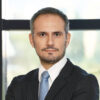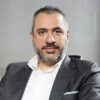This year Greece has been celebrating the 200th anniversary of its independence, and it has been doing so in the midst of a dramatically changing post-pandemic world. As all of us around the globe work to lay the groundwork for sustainable development, we need to ensure that democratic principles and human values are ironclad. In line with the 32nd Greek Economic Summit (GES 2021), organized by the American-Hellenic Chamber of Commerce in cooperation with the Athens Stock Exchange and with the strategic partnership of the U.S. Chamber of Commerce and the Atlantic Council, this issue’s Thought Leaders section features a collection of articles discussing ways to contribute toward and ensure a sustainable and prosperous future for all. Our Thought Leaders address the various worrying trends that threaten to undermine democratic values and social cohesion and present their thoughts and ideas on how to help shape a roadmap toward a future of inclusive and sustainable growth.

New World New Equation
By Kyriakos Andreou, Partner, Territory Advisory Leader, PwC Greece
The Covid-19 pandemic has accelerated our entry into a new world in which issues of prosperity, use of technology, institutional legitimacy, and leadership — all dangerously intertwined — are becoming increasingly difficult to ignore, forcing us to rethink and to start reconfiguring our world for a more sustainable future.
Social cohesion is a fundamental prerequisite for the foundation of trust that businesses and citizens must rely upon to plan for their future
Digital innovation is reshaping the way we live and work, altering our habits and the skills we need to succeed, and also creating imbalances in the labor market. Yet it is also fueling improvements in our quality of life and productivity, even in areas where it previously seemed impossible to achieve sustainable outcomes due to a lack of trust. A great use case has been the gradually digitalized relationship of the citizen with the state; for example emvolio.gr and gov.gr.
But there are more challenges ahead, with climate change, in particular, forcing us to rethink the very logic behind our problem solving. Sustainability as a business priority is an all-encompassing, sprawling topic, making it challenging for governments, organizations and citizens to know where to begin. This is accelerating a new growth model that will invariably also include crisis management as an integral component of what the new normal entails.
Increased levels of uncertainty and volatility pose issues of inclusive growth, with a real threat arising from the marginalization of sections of our society, accentuated not only by the rise of automation but also by climate change and global events and agreements that have an impact locally. Unsurprisingly, populism grew in the face of these challenges, by creating the illusion that there are threats or foes external to our sphere of influence that are always at fault. By hopefully leaving this phase behind it, Greece has a real chance of finding an alternative path ahead. There seems to be a window of opportunity to reestablish a new economic model of growth and prosperity. Social cohesion is, however, a fundamental prerequisite —and a very complex one to measure, let alone tackle — for the foundation of trust that businesses and citizens must rely upon to plan for their future.
Everyone should be able to live, learn, work and participate in the digital world, so the need to upskill and reskill the workforce has never been more urgent. However, employment and skills are just one part of a new equation. We are all acutely aware that this new digital world requires us to envisage ways that demonstrate in action how shared prosperity can be achieved.
So how do we move from theoretical discussions into action? To tackle the challenges and opportunities ahead we must build the path forward on key values: diversity of thought, equity and transparency in how we operate and reward each other’s contributions, and of course measuring and improving inclusiveness in a human-led, tech-enabled world. All these are part of a much broader new equation on what success really means, one which requires a new mindset and a different compass with an extended set of KPIs that doesn’t take a narrow view of the world and the definition of economic progress. It is expansive and recognizes the deep interdependencies at the heart of sustained economic and social success. At its heart, this means a clear and self-reinforcing link between building trust and the ability to deliver sustainable outcomes.

How Sustainable Corporate Governance Can Spur Longterm Value and the Role of Boards
By Andreas Hadjidamianou, Partner and Head of Assurance Services, EY Greece
The pandemic has increased the expectations of stakeholders, including employees, clients, investors, and society at large, that organizations should play a more active role in tackling major societal issues, such as inequality and climate change. At the same time, however, it has made it more challenging to focus on longterm value creation, as corporate leaders were forced to address short term challenges, including, in some cases, the survival of their companies.
To be authentic and accountable, companies must learn to communicate both good news and bad news
According to EY’s “Long Term Value and Corporate Governance Survey,” 66% of respondents said Covid-19 has increased expectations from stakeholders that their company will drive societal impact, environmental sustainability, and inclusive growth, while 59% reported that the pandemic’s impact on financial performance has challenged their ability to focus on longterm growth.
Sustainable corporate governance can bridge this gap. Boards need to focus on five governance-related areas to balance short- and longterm needs.
Board skills, diversity and values: To make decisions that generate longterm value, leaders must be able to speak their minds. They must debate openly, consider the interests of all stakeholders, and proactively identify and engage potential investors focused on longterm value.
Risk governance and oversight: Understanding and mitigating business risk has always been a critical function of boards. However, companies’ risk frameworks and appetites have traditionally been geared toward short term shareholder returns, rather than longterm, inclusive growth. To pursue initiatives with longer time horizons, companies need to better understand longterm risk and the likelihood of success, by improving their risk assessment and management capabilities.
Reward: To reward executives for generating sustainable growth, compensation schemes need a mixture of near- and longterm incentives. As focus shifts to metrics related to ESG goals, companies need to determine which metrics are most relevant to them, and boards need to set in place robust processes and controls, including board committee oversight. Moreover, the percentage of executive pay tied to metrics that reflect longterm value should increase.
Stakeholder engagement: Organizations firstly need to identify and prioritize their key stakeholders. They must then get them onboard, develop loyalty and understand what is important to them, what their needs are, and how they factor into the board’s decisionmaking. Finally, boards need to show stakeholders that their concerns are considered seriously, even if they do not always act in accordance with their viewpoint.
Authenticity: To be authentic and accountable, companies must learn to communicate both good news and bad news. This requires changes to frameworks and practices, but also to mindset and culture. Boards need to introduce effective controls that support the quality, reliability, and consistency of both financial and non-financial reporting. This may require the effective reinvention of corporate reporting and a shift to forward-looking insight based on financial and non-financial disclosures (e.g. ESG disclosures).
A radical change such as this constitutes a major challenge for companies. Globally consistent frameworks providing firm guidance on metrics and reporting standards can help steer companies toward turning longterm value creation for all into reality.

The Time for Change is Now
By George Handjinicolaou, Chairman, Piraeus Bank
The ongoing public health crisis and its impact on the global community and economy have highlighted new priorities that must be established at a global level and adopted, collectively, by all of humankind. There is only one path that leads to the future: the path of sustainable development. A path of global and decisive mobilization against the climate crisis and of balanced economic and social development. It is a difficult path that requires international cooperation and multilateral global commitments to wholly transform economic and growth models that have taken shape in recent decades. And the catalyst for accelerating developments and rapidly moving forward with the big and hard changes required will be the realization that international organizations, states, financial systems, and societies all share a stake in this.
International organizations, states, financial systems, and societies all share a stake in this
It is particularly encouraging that, with maturity and determination, the European Union is at the forefront of this effort, having adopted a comprehensive strategy with a vision and with clear and defined goals for a sustainable future — a strategy supported by the mobilization of huge financial resources and requiring the coming together of the public and private sectors, as well as the contribution of the banking sector, to implement sustainable development projects as defined at the European level.
This finds Greece at a crucial juncture. Despite dealing with the pandemic and other challenges including rising energy prices, the country has been able to put its economy on a strong recovery trajectory, as demonstrated both by GDP growth data and by the stable positive development of key economic performance indicators. The Greek economy is steadily moving into a new era that will be defined by multilevel reforms that will form the solid foundations for a radically different, sustainable development model. This journey will be supported with considerable funds — approximately €59 billion — from the EU Recovery and Resilience Fund and the NSRF, as well as from the mobilization of private investment capital drawn to the economy’s prospects.
Considerable capital is already invested in our country in crucial areas closely related to the sustainable development strategy laid out in the Greece 2.0 National Development Plan, which constitutes a comprehensive framework of reforms guaranteeing the transformation of the productive base of the economy and allowing for full absorption of European funds. The key to this, and to the implementation of reforms to transform the productive model, is the mobilization and participation of the healthy private business sector and the realization of sustainable investments. For European funds to be absorbed, there must be healthy businesses and investors with credible investment plans.
The Greek banking system is fully prepared to take on its role in managing and utilizing the European funds while also providing comprehensive support to the business sector, the true protagonist of the country’s grand development endeavor. At Piraeus Bank, we are strategically committed to actively contributing to the sustainable development of the Greek economy, with an emphasis on supporting healthy entrepreneurship, the green and digital economy, clean technology, innovation, and the restructuring of the agrifood sector.
Greece now has the unique opportunity to change its productive model and put down the foundations for a sustainable future. We have the plan, the funds, and favorable conditions. What we need now to successfully move Greece and Greek society into the future is daring, determination and dedication to the goal.

Creating the Infrastructure of Sustainability
By Tasos Manos, CEO, Hellenic Electricity Distribution Network Operator (HEDNO)
Τhe world nowadays faces two major challenges: recovering from the Covid-19 crisis and dealing with climate change. Most countries globally have been affected by the pandemic and climate change is undoubtedly a major threat facing all of humanity. Both challenges demand bold new approaches in order to move from crisis to resilience in the areas of prevention, early warning, strengthening social cohesion, improving access to services for all, and accelerating sustainable development.
Infrastructure plays a key role in sustainable development, especially when it comes to conserving natural resources and reducing the impact of climate change
Infrastructure systems form the backbone of every society, providing essential services such as energy, water and telecommunications. Infrastructure, therefore, plays a key role in sustainable development, especially when it comes to conserving natural resources and reducing the impact of climate change. Investment in infrastructure is at an all-time high globally, and I strongly believe that this trend must continue if we are to succeed in our goal of sustainable development.
In Europe, the energy system is in transition toward clean energy, low carbon economy and high efficiency. Across Europe, distribution system operators (DSOs) such as HEDNO (Hellenic Electricity Distribution Network Operator) have a leading role to play in the energy transition and the achievement of the SDGs set by the United Nations. DSOs are connecting increasing amounts of distributed energy resources to their networks, thereby actively facilitating and contributing to this energy system transformation. They are adopting new business models and are gradually transforming from traditional grid operators into high end IT data operators.
For DSOs to successfully evolve into data-centric companies and upgrade the infrastructure they operate and the services they provide, more investments are needed. Technology is once again the key for this transition, since DSOs must develop smart grids and implement all the necessary solutions to create an interactive energy market.
HEDNO is committed to supporting this change by embracing and taking on new roles, upgrading and modernizing assets and systems, and adopting new technologies for smart grids and digitalization. Our strategy is focused on the integration of modern technologies such as smart grids, remote metering, remote services, and automations, and we are moving forward with increased and accelerated investments for network modernization and digitalization with a new CAPEX plan.
Our investment plan includes projects for reinforcing and modernizing the distribution network with a core of fundamental strategic projects. These strategic projects will pave the way towards the smart grids era in Greece, thus enabling the development of new market services and achieving an optimal combination of quality and low cost. The projects cover a wide range of modernization activities, including smart meters, remote control systems, improved customer service systems, improved planning and procurement. The benefits from these projects greatly contribute to better efficiency, increased quality and environmental protection.
Our digital transformation will allow us to provide flexible products and services, motivate and enable prosumers’ involvement and implement smart grid innovative technologies.
The post-Covid world depends largely on the decisions and the actions we implement today. Everyone has a role to play, and infrastructure operators such as HEDNO must contribute strongly in order to rebuild the economic engine and create sustainable value.

Data Literacy as the Safeguard for a Future of Equal Opportunities
By Yiannis Papatsiros, Regional Lead for Greece, Cyprus, Bulgaria, SAS
Would you trust an algorithm to perform open-heart surgery, knowing that it can make the optimum decision in nanoseconds, in (machine) cold blood? Would you put in the hands of an algorithm the litigation of your appeal, with the confidence that its objectivity cannot be tampered by personal feelings and mood swings? Questions like these might have seemed absurd or even dystopic some years ago. Today, they are valid points in the ongoing dialogue about a digital future of prosperity and equality, where data-driven decisions have the power to eliminate prejudice based on gender, race, income, or social class.
Now is the time to make data accessible to everyone and build a sustainable and resilient society, based on the equal access of everyone to information and insights
We ascertain daily the power machine learning and AI have in making the world a better place; from our very beginnings, when SAS dedicated its expertise to agriculture for better crops, to the outbreak of Covid-19, when our algorithms were put at the service of governments to combat the pandemic, and our very recent initiative in preventing gender-based violence with the power of data, along with UNFPA (United Nations Population Fund), we, at SAS, know for sure that data can drive us to a better world and future of equal opportunities, as it is the case at SAS today.
The unbiased nature of data and algorithms can certainly lead to an inclusive future, of equal opportunities. But they can also create another discrimination, between the data literate and those not acquainted with data. For people to thrive in the future, it is our duty as leaders to promote data literacy, both in the corporate world and in society.
At SAS, we have always been dedicated to making data management accessible to everyone. That is why, working with the Hellenic Federation of Enterprises (SEV), we created the AI Minds Academy, which aims to enhance the digital skills of the future generation and use the power of analytics and artificial intelligence to fuel the digital transformation of Greece.
But data literacy is not only for data scientists. Since the beginning of our journey, we have paved the way for this kind of future with a vast array of simple solutions, user friendly for the majority, but also smart enough to meet the highest expectations of the global economy. We believe in the power of ecosystems and share our vision of the democratization of analytics and AI because the migration of analytics applications to the public cloud also marks an opening of these environments to profiles of non-specialists. For example, Viya is an open platform where any company can accelerate its digital transformation, no matter what systems and applications it already uses.
And that is just the beginning. To preserve our democratic values in this data-driven promised land, we, as leaders, must guarantee a minimum level of data literacy for every citizen, so as for everyone to understand how data is being collected, analyzed, and transformed, and make informed decisions on it. Democratization of data was never a euphemism for us. Now is the time to make data accessible to everyone and build a sustainable and resilient society, based on the equal access of everyone to information and insights.

Progressing Equality and Inclusion Within Our Walls and Beyond
By Despina Passaris, Senior Director of Communications, P&G Central and South East Europe
Inequality in our society is broadly visible. In fact, it has been woven into the fabric of our culture in many ways we don’t even recognize. We can look no further than the Covid-19 pandemic, which while affecting us all, is affecting communities with varying degrees of impact, with the most vulnerable groups of people (such as refugees, homeless, etc.) being more impacted.
The change we need is broad and deep and requires us all to be active
At P&G, we choose to be a force for good and a force for growth in full recognition that our success is grounded in the success of our own employees, the consumers who we serve, our business partners, and the communities where we live. All of them. And we are committed to acting.
We aspire to be a company where our employees feel engaged and encouraged to bring their full authentic selves to work. Diversity accelerates our ability to innovate, to solve problems that make meaningful differences for those we serve. We are building a diverse employee base to reflect the diversity of our society and strive for 50/50 gender representation at leadership, something we have already achieved in several countries including Greece. We continue to build equal and equitable access to our policies and practices across talent, compensation and benefits — from our flex-at-work policies being used equally by men and women to our parental leave program, “Share the Care,” which provides benefits to birth mothers, adoptive parents and fathers.
At the same time, our brands reach billions of consumers, every day. As the world’s largest advertiser, we have a responsibility to help eliminate bias and promote equality by not stereotyping, diminishing, or misappropriating, through accurate and respectful portrayals of all. And we work with media partners for more inclusive communication. Since August, P&G makes TV ads accessible for more than three million people with hearing disabilities across southeast Europe, leading the way in this most critical area by broadcasting commercials with subtitles.
We are also committed to diversifying our supply base. As a large company with a broad portfolio and footprint, we have the responsibility and opportunity to build equality, equity, and inclusion into our supply and value ecosystem through and with our partners.
And last but not least, we are committed to being a force for good and a force for growth in the communities where we live and work. We are making thoughtful decisions about where and how to focus our citizenship resources with the aim to enable more people to thrive in local communities. We engage in partnerships corporately or through our brands that reflect and model the inclusivity we want to see in our society.
We believe companies and brands have the unique opportunity to step up and use whatever power they have to eliminate bias and promote equality and inclusion. We know our company is not perfect. Our cities are not perfect. Our country is not perfect. Precisely because of this, we all have work to do. The change we need is broad and deep and requires us all to be active.

In the Age of Climate Change, Environmental Risks Are Business Risks and Technology Can Help
By Spyros Poulidas, Chairman and CEO, IBM Greece and Cyprus
IBM has been committed to environmental leadership for decades. The company has been setting, and achieving, voluntary environmental goals for many years and has consistently reported results in its annual Corporate Environmental Report for 30 years. Across the decades, the people of IBM have sustained the company’s commitment, whether the topic has been popular or not and regardless of short term economic or business cycles. For example, IBM set its first goal regarding CO2 emissions in 2000 and has been voluntarily disclosing its CO2 emissions since 1995.
It is key to boost collaboration and harness the creativity of the entire innovation ecosystem worldwide
In fact, earlier this year, we announced 21 new and updated environmental goals, including a commitment to achieve net zero greenhouse gas emissions by 2030, that will drive our actions going forward. Collectively, our goals cover energy and climate change, conservation and biodiversity, pollution prevention and waste management, supply chain and value chain, and our global environmental management system. In the spirit of sustaining sustainability, IBM once again updated its goals to achieve net zero greenhouse gas emissions by 2030 in a way that is applying across the world where we do business. The company will accomplish this goal by prioritizing actual reductions in its emissions, energy efficiency efforts and increased clean energy use across the more than 175 countries where it operates. IBM’s net zero pledge integrates transparency and authenticity since it establishes and updates near-term targets to drive accountability and progress.
To achieve its net zero goal IBM will reduce its greenhouse gas emissions 65% by 2025 against base year 2010. What’s most important in the fight against climate change is to actually reduce emissions. The company’s net zero goal is also accompanied by a specific, numerical target for residual emissions that are likely to remain after IBM has first done all it can across its operations to reduce. Additionally, it will procure 75% of the electricity it consumes worldwide from renewable sources by 2025, and 90% by 2030. We’ve been working towards this for a while. IBM made its first purchase of renewable energy in 2001 and this announcement is the third generation of our renewable energy goal. It will use feasible technologies, such as carbon capture (in or by 2030) to remove emissions in an amount that equals or exceeds the level of IBM’s residual emissions.
Climate change is a challenge that cannot be solved with old-fashioned methods and requires accelerated scientific progress using new methodologies and technologies such as AI, robotics, quantum computing, HPC, and a hybrid cloud approach to make sense of relevant data. Climate change is a serious concern that requires timely and meaningful global actions, which is why it is key to boost collaboration and harness the creativity of the entire innovation ecosystem worldwide. We are proud that our continued commitment to environmental sustainability has been recognized with the inaugural Terra Carta Seal, which is awarded to global corporations that are demonstrating their commitment to, and momentum towards, the creation of genuinely sustainable markets.

Sustainability DNA is at the Core of Value Creation
By Dr. Kyriacos Sabatakakis, Country Managing Director, Greece, Accenture
The health, economic and social crises of recent times have raised people’s expectations about the role of business in solving global problems. But progress on most of the United Nations’ 17 Sustainable Development Goals has stalled or been eroded.
strong Sustainability DNA is associated with higher financial value for companies as well as higher ESG impact
When Accenture interviewed business leaders at the height of the pandemic, 73% of them identified “becoming a truly sustainable and responsible business” as a top priority for their organization over the next three years. Yet there is still a tendency for leaders to worry that sustainable impact lies in opposition to financial value which can be a barrier to achieving results.
So, how can they turn that purpose into profit and drive toward sustainability faster?
Leadership qualities are a crucial part of the equation. Companies that foster the five elements of responsible leadership — namely stakeholder inclusion, emotion and intuition, mission and purpose, technology and innovation, and intellect and insight — will be in a stronger position than their competitors.
However, leadership in isolation is no longer enough. To become a truly sustainable organization, business and operating model transformation is necessary. The prerequisite is to build a stakeholder-centric organization.
New research from Accenture and the World Economic Forum (WEF) finds that those steeped in the principles of responsible leadership are more likely to drive fundamental organizational change by strengthening their ‘Sustainability DNA’, bringing together a sense of purpose, environmental awareness, enabling technologies and human centricity and 10 enablers that drive human connections, collective intelligence and accountability at all levels. Sustainable organizations are purpose-led businesses that inspire their people and partners to deliver lasting financial performance, equitable impact and societal value that earns and retains the trust of all stakeholders. Essentially, strong Sustainability DNA is associated with higher financial value for companies as well as higher ESG impact.
Our Sustainable Organization Index found a strong, positive relationship -among 4,000 companies examined- between how they scored in the index and how they performed in terms of financial performance. But, with an average of only 52/100 on the Index, there is huge potential to increase performance.
So, what practical steps can leadership teams take to strengthen their organizations’ Sustainability DNA?
We recommend leaders commit to a three-stage cycle of change -Diagnose, Define, Develop- to generate value for all stakeholders. This can inform a wider, dynamic program of organizational transformation. Crucially, our analysis suggests that high-performance organizations pursue this sequence continually, adapting as circumstances change, as new stakeholder expectations arise and as new organizational capabilities emerge.
As a conclusion, operating sustainably and equitably is now a business imperative. By shifting a company’s culture and mindset, leveraging new technologies and ESG Data and embedding stakeholder-centricity at the heart of organizational transformation, leaders can deliver multi-dimensional value to all stakeholders. Those who ignore this moment to position for the future, risk being left behind.






